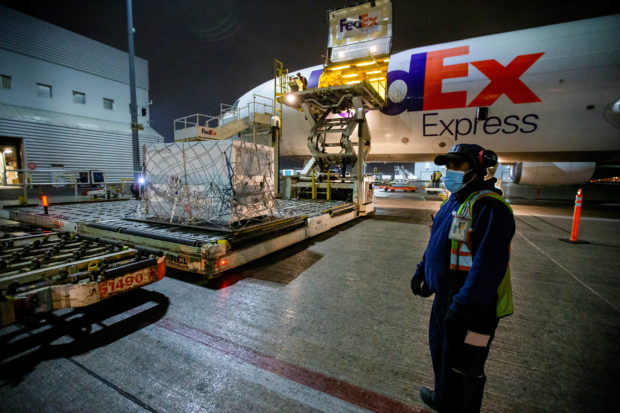Canada’s lagging COVID-19 vaccine campaign set to ramp up as virus variants spread

FedEx employees unload a shipment from Europe of the Moderna vaccine against the coronavirus disease (COVID-19) at Toronto Pearson Airport in Mississauga, Ontario, Canada March 24, 2021. REUTERS/Carlos Osorio
TORONTO/OTTAWA – Canada is expecting enough COVID-19 vaccine doses to double its supply by the end of next week to help ramp up a slow vaccination program as more contagious virus variants push the country toward a third wave of coronavirus infections.
Canada has lagged other rich countries in inoculations even though it ordered enough doses to vaccinate the population five times over late last year.
Those procurement deals, however, guaranteed relatively few doses in the first quarter of 2021 with a sharp increase in the second quarter. Officials said on Friday that 6.8% of the population had received at least one shot of a vaccine. That compares with 24.5% of U.S. residents as of Monday.
Shipments of 4.7 million doses are expected this week and next – 2.4 million from Pfizer Inc, 846,000 from Moderna Inc and a 1.5 million-dose loan of AstraZeneca’s vaccine from the United States, according to federal forecasts and recent announcements.
Future deliveries could be threatened if the European Union limits shipments from the Pfizer or Moderna operations in Europe that supply Canada. Canada has been told European exports will be allowed, a spokeswoman for International Trade Minister Mary Ng, said on Wednesday
Article continues after this advertisementNg’s counterparts in Europe “have assured her that these measures will not affect vaccine shipments to Canada,” Youmy Han said.
Article continues after this advertisementA Pfizer spokeswoman said export licenses had already been granted for deliveries this week and next, and that one has been requested for the week of April 5. Canada expects a million doses a week from Pfizer through the end of May.
On Wednesday, two sources told Reuters India has put a temporary hold on all major exports of the AstraZeneca vaccine made by the Serum Institute of India (SII) to meet domestic demand as infections rise there.
Canadian Prime Minister Justin Trudeau, who has promised a vaccine to whomever wants one by the end of September, said there is no indication the 2 million AstraZeneca doses Canada expects from SII will be held back.
‘SENSE OF RELIEF’
Rising shipments and a policy of delaying second shots of the two-dose vaccines will enable the country to ramp up mass vaccination sites and some pharmacy distribution programs for older residents – two months after the United States.
“It certainly does provide a sense of relief,” said Isaac Bogoch, infectious diseases specialist at Toronto General Hospital and a member of Ontario’s vaccination distribution task force.
Canada is facing the possible beginning of a third wave of infections as the more transmissible B.1.1.7 virus variant first discovered in the UK drives outbreaks in some hot spots.
“We just have to make sure that this race between variants and vaccines is won by the vaccines,” Trudeau said in a radio interview on Wednesday. “It’s possible that many, many Canadians will have their first doses by the time summer rolls around.”
The country received just under 4.8 million doses of COVID-19 vaccines between late December and March 17.
Canada is stretching the vaccine supply by offering second doses as long as four months after the first, which means Canadians will have to wait longer than U.S. residents to be fully vaccinated. In the United States, second shots of the Pfizer/BioNTech vaccine are given three weeks after the first, and the Moderna four weeks, mirroring dosing schedules in their clinical trials.
“We’re going to be in an extremely bizarre position in Canada where, for a period of many months, some people will have had zero doses of a vaccine, some people will have one dose, and some people will have two doses,” said Bogoch. “I think we need some very pragmatic advice from a federal centralized source about what’s acceptable.”
The National Advisory Council on Immunization (NACI), which makes non-binding but influential recommendations on how provincial health systems should use vaccines, said modeling suggested delaying the second dose would reduce illness and deaths while the vaccine supply is limited.
“It makes a lot of sense to try to get as many people vaccinated as quickly as possible,” said Catherine Hankins, a McGill University epidemiologist and co-chair of another federal advisory group, the COVID-19 Immunity Task Force.
“I’m convinced by looking at the data from other countries that show rapid rollouts to the most number of people has the biggest impact,” she said.
gsg
For more news about the novel coronavirus click here.
What you need to know about Coronavirus.
For more information on COVID-19, call the DOH Hotline: (02) 86517800 local 1149/1150.
The Inquirer Foundation supports our healthcare frontliners and is still accepting cash donations to be deposited at Banco de Oro (BDO) current account #007960018860 or donate through PayMaya using this link.